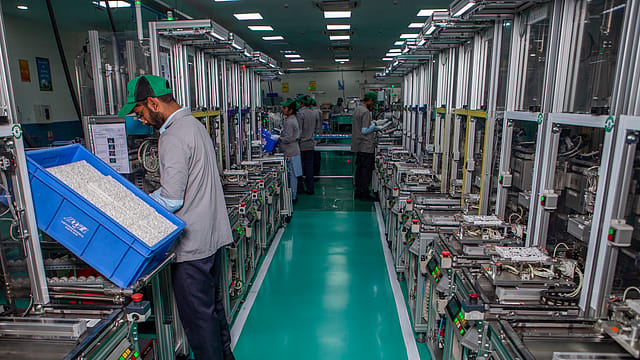Manufacturing PMI: Factory output growth slowest in six months
ADVERTISEMENT

India's manufacturing sector activity expansion slowed to a six-month low in March 2022 as companies reported tepid growth in factory orders and production.
The seasonally adjusted S&P Global India Manufacturing Purchasing Managers' Index (PMI) fell to 54.0 in March from 54.9 in February, highlighting the weakest rate of growth since September 2021.
A reading above 50 indicates an overall increase in output compared to the previous month.
Growth has now been seen in each of the past nine months, with the headline figure remaining above its long-run average of 53.6.
Rising sales supported a further upturn in production volumes, S&P Global said, adding goods producers indicated that new orders continued to increase in March.
The data, however, pointed to subdued optimism towards growth prospects among Indian manufacturers, with the overall level of sentiment slipping to a two-year low, the survey said.
Output prices rose in March as goods producers sought to share part of the additional cost burden with their clients. The rate of charge inflation picked up to a five-month high, but was moderate and matched its long-run average.
January 2026
Netflix, which has been in India for a decade, has successfully struck a balance between high-class premium content and pricing that attracts a range of customers. Find out how the U.S. streaming giant evolved in India, plus an exclusive interview with CEO Ted Sarandos. Also read about the Best Investments for 2026, and how rising growth and easing inflation will come in handy for finance minister Nirmala Sitharaman as she prepares Budget 2026.
Manufacturers reported another increase in input prices at the end of fiscal year 2021-22. Chemical, energy, fabric, foodstuff and metal costs were all reportedly greater than in February, the survey said.
"Manufacturing sector growth in India weakened at the end of fiscal year 2021/22, with companies reporting softer expansions in new orders and production," said Pollyanna De Lima, economics associate director at S&P Global.
The slowdown was accompanied by an intensification of inflationary pressures, although the rate of increase in input costs remained below those seen towards the end of 2021, the survey said. Goods producers signalled higher prices paid for chemicals, energy, fabric, foodstuff and metals, despite supplier performance worsening to the least extent in almost a year.
"Once again, we saw the transfer of rising cost burdens to clients, with charge inflation at a five-month high. "For now, demand has been sufficiently strong to withstand price hikes, but should inflation continue to gather pace we may see a more significant slowdown, if not an outright contraction in sales," Lima said. "Companies themselves appeared very concerned about price pressures, which was a key factor dragging down business confidence to a two-year low."
The latest results showed a broad stabilisation in headcounts across the manufacturing industry, following three successive months of job shedding, the survey said.
Indian manufacturers purchased additional inputs in March. According to survey members, the upturn stemmed from stock-building efforts. Pre-production inventories continued to rise in March, marking a nine-month sequence of accumulation.
There was a renewed decline in new export orders received by Indian goods producers, ending an eight-month sequence of growth.
